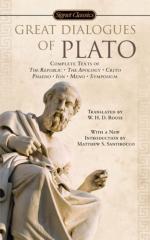
|
| Name: _________________________ | Period: ___________________ |
This quiz consists of 5 multiple choice and 5 short answer questions through Republic: Book VI.
Multiple Choice Questions
1. Which demographic of the Athenian population does Socrates single out for discussion?
(a) The sophists.
(b) The lawyers.
(c) The soldiers.
(d) The citizens.
2. What must the philosopher, according to Socrates in Book VI, employ in order to attain knowledge of "absolute good"?
(a) Judgment against "absolute evil."
(b) Hypotheses about what is good in the world.
(c) Public opinion of theoretical subjects.
(d) Guessing and hoping he gets lucky.
3. How does Polemarchus define justice?
(a) Being fair in all contexts.
(b) Doing good to one's friends and evil to one's enemies.
(c) Allowing each man to live his life freely.
(d) Stealing from the rich and giving to the poor.
4. Socrates believes that the Sophists________________.
(a) Have values worth learning from.
(b) Should be exiled on grounds of impiety.
(c) Are philosophers themselves.
(d) Are evil imitators posing as philosophers.
5. One large theme that permeates throughout Meno is:
(a) A proposition can only be deemed valid if it is testable in the empirical world.
(b) Learning is really a recollection of old knowledge.
(c) Non- virtuous people can still perform virtuous actions
(d) There can never be universal ethics.
Short Answer Questions
1. The common man is not concerned with beauty itself, but ___________.
2. Which of the following ideas are not mentioned in Book VI?
3. From which poet does Polemarchus derive his definition of justice?
4. In Republic: Book III, Socrates is first concerned with:
5. What assertion is made by Socrates when he responds to Adeimantus' point?
|
This section contains 350 words (approx. 2 pages at 300 words per page) |

|




